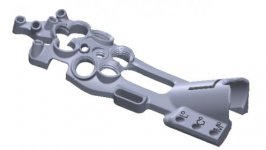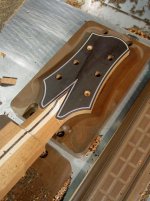So yeah, this is kind of why I was hesitant to mention it. But let's address the elephant in the room with another novella:
I've had to learn the hard way, via industrial auctions, the discipline to not pick things up - no matter how hypothetically useful or how good a deal - until I actually need or have an imminent use for them. Doing otherwise is a good way to burn money on hasty and ultimately counterproductive decisions. If there's a truly insane deal on something I might make an exception (e.g. if that same Brother mill was on sale for $35k), but otherwise it's liable to create more problems than it solves. Until everything else is in place and I'm ready to cut a check the moment I find something it's premature to even look at the used market. Just as with the auctions, there is always another one.
As I mentioned in my update it's not hard to feature-creep your way up without limit by taking small steps. Well if you're going to spend $50k, you may as well spend $60k. Well if you're already at $60k, what's $70k? It never ends, and soon your $50k budget for a shipped machine morphs into $90k...plus rigging...plus software licenses...plus that feature you forgot to check for in a rush to snag the machine that will cost you $5k to have the dealer install...plus that stupid dongle you didn't know about that costs $1500...plus that
other feature that you really wanted but whoops, it's not compatible with this casting, or with this controller version. Now you're stuck with it in the former case and looking at $20k for a new controller in the latter case. It's a great way to spin your wheels and add stress and hassle and complication for the sake of things that you don't actually need and that don't ultimately move the needle anyway. See: My two giant threads on this forum.
As for the Chinese machine that doesn't really scare me in and of itself. The reputation of Chinese equipment and quality is often well deserved, but there can be exceptions. I've seen both sides. There are highs and lows and they'll be missed if you only look at the average. In the absence of any other information I definitely wouldn't get one. Someone who has to make a decision quickly or is running production or a job shop would be way better served sticking to a widely known and exceptionally well-supported brand. Absolutely no argument there.
That's not my situation though, and I didn't just pick the first random machine I saw after searching "CNC" on Alibaba. I'm looking specifically at one company, after almost 2 years of doing background research on them, the machine, and the results and experiences of those who own them. A machine is shitty because it's shitty, not because it's Chinese. Even if every other Chinese machine is crap it doesn't necessarily mean
this one is crap. Just as Haas doesn't automatically become worse just because 100 trash-tier machine builders pop up around them.
I'm sure we can find some 80 year old machinists who will only use Starrett and dismiss Mitutoyo as "that Japanese crap made of rice paper," as they used to. Just as there are people who blanket-dismiss everything that comes out of China on account of the ball screws being lubricated with soy sauce or whatever, or an experience they had in another decade, with another machine, from another company. They've been right for a good long stretch, but eventually they'll be wrong and without pausing now and again to update their assumptions they'll continue being wrong. Meanwhile others are making good parts.
I don't expect them to go out of business in 5 years, they're at 20 and counting and only growing. Physical support will of course be limited, at least for the immediate future. On a machine this size there's really not
that much that can go wrong, short of dropping it off a forklift or it arriving with a misaligned table, but I haven't heard of that happening. Most anything else I feel comfortable taking care of if no technicians are available. Even if I need to rent a Faro arm for a day to realign something, that's no big thing, and the likelihood of needing that is pretty low. Just about all of the moving or sparky bits are standard, widely available hardware. Industry standard rails, ball screws, servos, connectors, drives, pumps, etc. Syntec, Siemens, and Fanuc all have support networks in the US.
As far as the geopolitical situation goes I can guarantee you that if a proper war (or total embargo) with China breaks out, getting parts for your machine tools will be the least of your concerns. The supply of certain spares for Haas, Okuma, Makino, Mori, et al will dry up as well. Even for those who don't technically manufacture in China (though most do), much of the componentry and hardware inside their machines touches or originates from the Chinese supply chain. Specifically some of the more irreplaceable and difficult to source parts like controls and the materials/subcomponents inside them.
As for 30 year old machines, I'm not interested. Their present-day performance and condition are unknowns unless you go to a lot of effort and expense to verify them pre-purchase. And you can't check everything. The controllers will be old and missing functionality and quality-of-life improvements. The most tangible improvements - rigidity, MRR, speed - aren't sufficiently relevant for 99% of the work I do nor the process the machine is slotting into. The intangible benefits - reliability, service - are a wildcard without a lot of background work. It's great that there's service but that won't bring me comfort if I have to drop an unexpected $20k on said service to refurbish the machine to get it to back to a usable, reliable state. Nor will the associated time, disruption, and headache. It can be a false economy. For those reasons I consider a 30 year old machine to be a much bigger risk. A 5-10 year old machine is less likely to be that beat up, but may be considerably more expensive as will the cost to remediate unexpected issues.
These are real risks to think about. If the counter to all of that is just "ya but at least it's not Chinese" then there's really nothing to talk about. No doubt there are some who would rather go back to using a Bridgeport from 1930 instead of a modern Chinese CNC mill, because at least it was made of American steel. I'm happy to leave them to it. And they're happy. Everybody wins.

It really wasn't my intention to spark a debate about this. I understand the motivation and experiences behind the distrust of Chinese machines and suppliers. It's
generally well founded and it's one I've also had for a long time, and for the most part continue to have in the absence of information. Otherwise it's case-by-case based on available evidence. I also appreciate that you're trying to help me avoid making a mistake. In my particular situation I think I've done enough research and background work, gotten enough amazing help from everyone here, and accumulated enough relevant experience to make a reasonably well-informed decision.
Having said all of that: I'm definitely not married to it and I'm also not opposed to used machines. Of course I'd much prefer a recent Haas or Brother. No question about it. If - when I'm at the point where I'm ready to cut a check - one is available within the budget I set and in the configuration I want, I'll be thrilled to jump on it. If not then I'm comfortable taking on whatever leftover risks the Syil presents. IMHO they're minor, manageable, and the potential upside is worth the cost of entry.
As I alluded to in my update the goal isn't to make the
perfect decision, as judged by hypothetical constraints and requirements that I don't actually have, while burning time and energy in the process. The goal is to unblock the process by making a good decision at the appropriate time. The Syil would meet that cutoff, as might a Brother or Haas. Everything else is window dressing.




